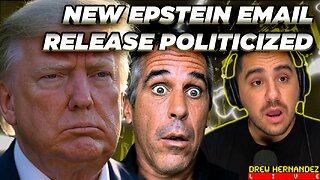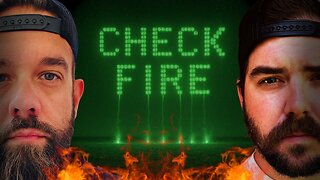Premium Only Content

How to Establish Credibility with Readers ft Celebrity Ghostwriter and Writing Coach Joshua Lisec
👉 Write a useful book that converts readers into high-paying clients. Free training shows you how: https://lisecghostwriting.com/golden/ 📖
Establishing credibility with readers is one of the most important, and often misunderstood, elements of writing a nonfiction book that actually sells. Celebrity ghostwriter and persuasive writing coach Joshua Lisec shares how to build credibility strategically—so readers don’t just finish a book, they believe the author, trust the message, and buy the next offer.
Most aspiring authors think credibility comes from listing credentials, telling a rags-to-riches story, or dropping testimonials throughout the text. But as Lisec explains, credibility isn’t declared—it’s demonstrated. Through persuasive writing and carefully structured storytelling, credibility emerges from the details, emotions, and results that make readers think, “This person really knows what they’re talking about.”
Many people start with the thought: I want someone to write a book about my life. That impulse can be powerful—but without the right structure, even the most remarkable life story falls flat. Lisec, a seasoned writing coach and celebrity ghostwriter, guides viewers through the steps to writing a book that not only captures attention but also establishes authority. He shows how to use a writing a life story template or a writing a nonfiction book framework to transform raw experiences into a compelling narrative that builds instant trust.
Credibility begins on page one. That’s why Lisec emphasizes how to start a book first sentence with impact. Whether the author is writing fiction based on real life or creating a purely nonfiction work, the opening must immediately show readers they’re in good hands. He discusses how to start writing a book for beginners—making it clear that credibility isn’t about fancy language or long resumes, but about clarity, confidence, and coherence from the very first line.
Throughout the discussion, Lisec dissects the invisible architecture of books that convert readers into believers. Using his expertise in persuasive writing, he shows how the best books naturally guide readers to say yes—to the author’s ideas, advice, or even paid programs. In his ghostwriting process, he blends narrative with social proof, making sure each story or example doubles as both credibility and persuasion.
One of the common mistakes aspiring authors make, Lisec notes, is focusing too much on “what” to do, without enough “how.” Readers crave concrete guidance. They want to know how to apply ideas in their own lives or businesses. That’s where many books fail. Lisec teaches how to bridge that gap by weaving the “how” into the fabric of your examples—through case studies, testimonials, and client results. This technique transforms a static story into a credibility engine.
For anyone who says, I need help writing a book or wonders how to write a book outline that balances authority with empathy, Lisec’s method offers a clear path. His approach ensures that every chapter has both instructional value and emotional resonance. Authors learn how to write a book outline that integrates the establishing credibility in business framework—showing proof of results without oversharing trade secrets.
Lisec also addresses how writing a nonfiction book differs from writing fiction. While fiction writers use imagination to create believability, nonfiction authors must turn reality into persuasion. He shows how to frame personal experience so it reads as universal wisdom. Whether the goal is to share a business journey, personal transformation, or professional insight, Lisec’s system of steps to writing a book makes credibility part of the story structure itself.
Those who want to write a book online or work with a celebrity ghostwriter often overlook that writing a book isn’t just about finishing a manuscript—it’s about making the reader trust the author enough to act. Lisec explains how to establish that trust through repetition, evidence, and voice consistency. The more aligned the message and the method, the stronger the credibility.
Lisec also explores how establishing credibility in business goes beyond books. A well-written book becomes a long-form trust signal that boosts authority across all platforms—speaking engagements, media appearances, coaching offers, and digital courses. When a reader says, “I feel like I know this person,” credibility has done its job.
He breaks down how to build credibility using personal narrative without sounding self-centered. Readers don’t just want to hear how successful an author is; they want to understand the struggle that shaped the success. Lisec advises balancing vulnerability with value—showing readers the human side while offering practical insights they can use. This not only builds connection but also increases believability.
Throughout the video, Lisec demonstrates how a book can serve as a funnel, converting attention into trust and trust into revenue. Every sentence, paragraph, and chapter becomes an opportunity to prove the author’s reliability. When done right, readers will finish the book and think, This person can help me. That’s how authors build lifelong audiences.
The conversation also delves into common author fears. Many worry that if they give away too much of their method in the book, no one will buy their courses or services. Lisec shows how to sidestep that trap. The secret lies in using examples—real client stories, detailed results, or “behind the scenes” explanations—as the “how.” Readers feel satisfied and informed, yet still motivated to learn more. It’s the perfect balance between generosity and curiosity.
For beginners wondering how to start writing a book for beginners or how to write a book outline that sells, Lisec’s advice is straightforward: start with credibility, end with transformation. Every section of your book should reinforce why readers should believe you and follow your guidance.
By the end of the video, authors and aspiring authors alike will understand that credibility is not an afterthought—it’s the foundation. Whether the viewer wants to write a book online, explore writing fiction based on real life, or simply learn the steps to writing a book, Joshua Lisec’s insights equip them with the clarity and strategy to succeed.
Through his lens as a celebrity ghostwriter, writing coach, and expert in persuasive writing, Lisec offers a roadmap for every author who wants to move beyond inspiration to influence. He shows how to establish credibility through storytelling, structure, and sincerity—so that when readers put the book down, they don’t just remember the message; they remember the author.
For anyone serious about how to establish credibility, building credibility through storytelling, or writing a nonfiction book that drives real-world results, this is essential viewing. Joshua Lisec doesn’t just explain credibility—he demonstrates it. His method proves that when authors tell their story the right way, readers don’t just read—they believe, they trust, and they take action.
-
 20:47
20:47
The White House
6 hours agoPresident Trump Signs Senate Amendment to H.R. 5371
30.4K33 -
 4:37:57
4:37:57
Drew Hernandez
23 hours agoNEW EPSTEIN EMAIL DROP FULLY POLITICIZED
54K17 -
 1:44:01
1:44:01
Tucker Carlson
5 hours agoTucker Carlson on the Israel First Meltdown and the Future of the America First Movement
57.8K404 -
 4:02:08
4:02:08
Alex Zedra
6 hours agoLIVE! Phasmaphobia New Map!
49.4K2 -
 2:16:06
2:16:06
Laura Loomer
7 hours agoEP155: Jihad Makes Its Move On The White House
42.8K60 -
 2:18:47
2:18:47
TheSaltyCracker
7 hours agoDem's Epstein Drop Backfires ReeEEStream 11-12-25
103K216 -
 17:08
17:08
Demons Row
7 hours ago $5.17 earnedMost Dangerous Motorcycle Clubs That Ever Existed 💀🔥
35.1K4 -
 12:51
12:51
The Gun Collective
9 hours agoWOW! -- LOTS of new GUNS just came out!
17.3K10 -
 2:06:53
2:06:53
I_Came_With_Fire_Podcast
16 hours agoWhat IS America First | Al Qaeda in the White House | China's Spy Highway
14.4K5 -
 1:46:55
1:46:55
Adam Does Movies
11 hours ago $0.71 earnedTalking Movies + Ask Me Anything - LIVE
10.8K